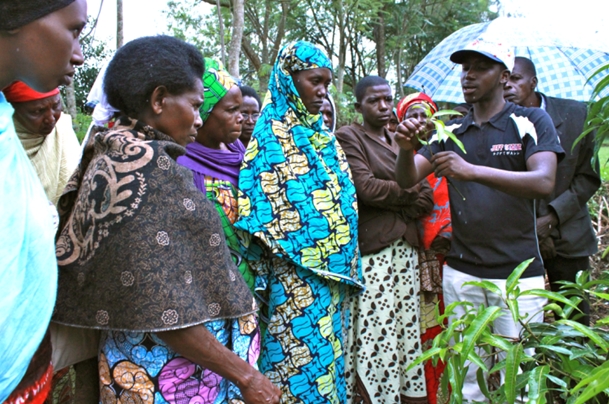
Last Thursday, 96 of the participants on the Widowed Survivors Empowerment Project (WSEP), funded by the UK Department for International Development, traveled from around Rwanda to meet in AVEGA East to partake in study tours.
Every one of the 32 income-generating groups from AVEGA which have received training through WSEP since the start of the project in April 2012 was represented, with three leading women arriving from every group countrywide. Upon completion of business training, the study tours serve as an opportunity for the women to visit exemplary members and projects that have come before them. In seeing innovative methods and techniques first hand, the women learn best practice for different projects and build confidence for themselves.
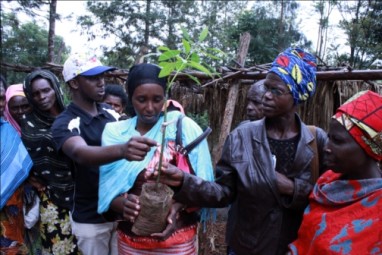
The women loaded into the buses and headed to GACO organic farm training center. At Gaco, they learned about planting kitchen gardens in their homes to alleviate household malnutrition. The trainer demonstrated grafting modern trees with traditional trees to yield a better, faster harvest of fruits. They were introduced to the ease of raising rabbits, and how to effectively collect waste to create their own compost and fertilizer. A smaller demonstration site showed how the women would be able to engage in these activities on a small plot of land.
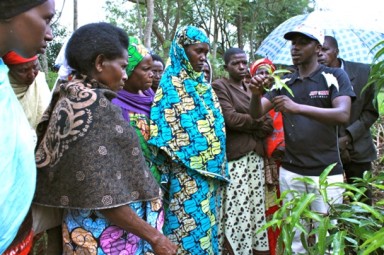
For the second tour, we visited a successful AVEGA group called Ishemwe. Gathered under the market roof, the group leader, Liberata, told the story of how they had gone from struggling genocide widows to thriving entrepreneurs. She explained how proper accounting of funds and rigorous saving enabled them to pay off a 1.5 million franc (£1,500) loan in 6 months.
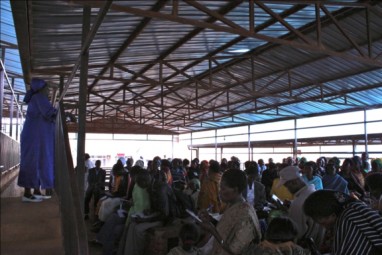
Now on their third loan, the group members have been able to get electricity in their homes, help their children through school and build bathrooms and kitchens. Their success, as demonstrated and explained at the study tour, provided a relatable model of success for the members of WSEP.
For the last study tour, we headed into a model village where an impressive, model farmer and AVEGA member, Vestine, lives. Vestine explained how she had also started just as they had, having lost her husband in the genocide and unable to cope with trauma.
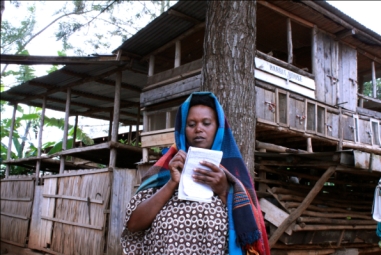
Through the help of SURF and AVEGA, Vestine was able to rebuild her life. She walked the women around her compound, which is covered with kitchen gardens. For Vestine, everything on her property must have a purpose. She described the process of creating biogas from her three cows, which she then uses to cook. She showed the women how to hold up an egg from her chicken coop to check if it’s fertilized, and how to tend to the 60 eggs in an incubator for 21 days before they hatch.
Most of the women wanted to stay and continue asking questions, bringing us well into the night and not packing into the buses until 7pm. On Friday morning, we had a feedback session where the women expressed their appreciation.
“This training was very helpful. From Gaco we learned about natural fertilizer and how it is much better than chemical fertilizer. From the Ishemwe group, we learned how useful it is to work in a team. If someone is failing, we make an effort to work together to help them. We’ve learned the way to use biogas, and will work very hard so that every person in the group will have biogas. The only challenge was that this time was very short, if possible we can have 5 days. “
The work now will be to implement the learning from the study tour to improve and strengthen the livelihoods of AVEGA members. Through additional funding from the Good Gifts Catalogue for livestock and farming projects, Survivors Fund (SURF) will be supporting thousands of genocide widows over the year ahead to achieve exactly that.
This is an edited version of a report compiled by Kelsey Finnegan, SURF Rwanda Project Officer.
